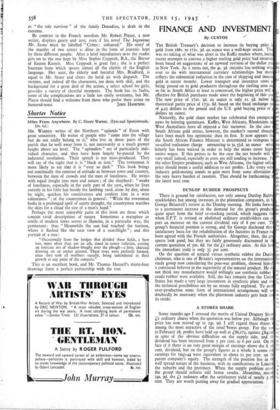Shorter Notice
MR. WARREN writes of the Northern " uplands " of Essex with great sensitivity. He writes of people who "come into the village but do not really belong to it,' who live in those parts of the parish that lie well away from it, not necessarily at a much greater height above sea level. The " uplanders " are of particularly indi- vidual character, and they have been largely by-passed by the industrial revolution. Their speech is not mass-produced. They will say of the night that it is "black as iron." The townsman is more likely to say that it is "ever so dark." This book brings out continually the contrast of attitude as between town and country, between the men of crowds and the men of loneliness. He writes with equal insight into men and nature ; of the shepherd: "weeks of loneliness, especially in the early part of the year„ when he lives entirely in his little hut beside the lambing yard, alone by day, alone by night, quicken his sensitiveness and confirm him in a wise solitariness " ; of the countryman in general: "While the townsman basks in a prolonged spell of sunny drought, the countryman watches the skies for a cloud the size of a man's hand."
Perhaps the most enjoyable parts of this book are those which contain vivid descriptions of nature. Sometimes a metaphor or simile of modern times serves to illumine, in a particular way, the permanent: thus "Meanwhile the sun had touched the horizon, where it flashed like the near view of a searchlight " ; and this portrait of a tree :
"Occasionally from the hedges that divided these fields, a bare tree, more often than not an ash, stood in sunny isolation, casting an Intricate net of shadow-boughs over the plough—a firm, charcoal drawing on an amber ground. These trees were perfectly formed, since they took all weathers equally, being unhindered in their growth at any point of the compass."
This is an excellent book, and Mr. Thomas Hennell's thirty-four drawings form a perfect partnership with the text.


























 Previous page
Previous page